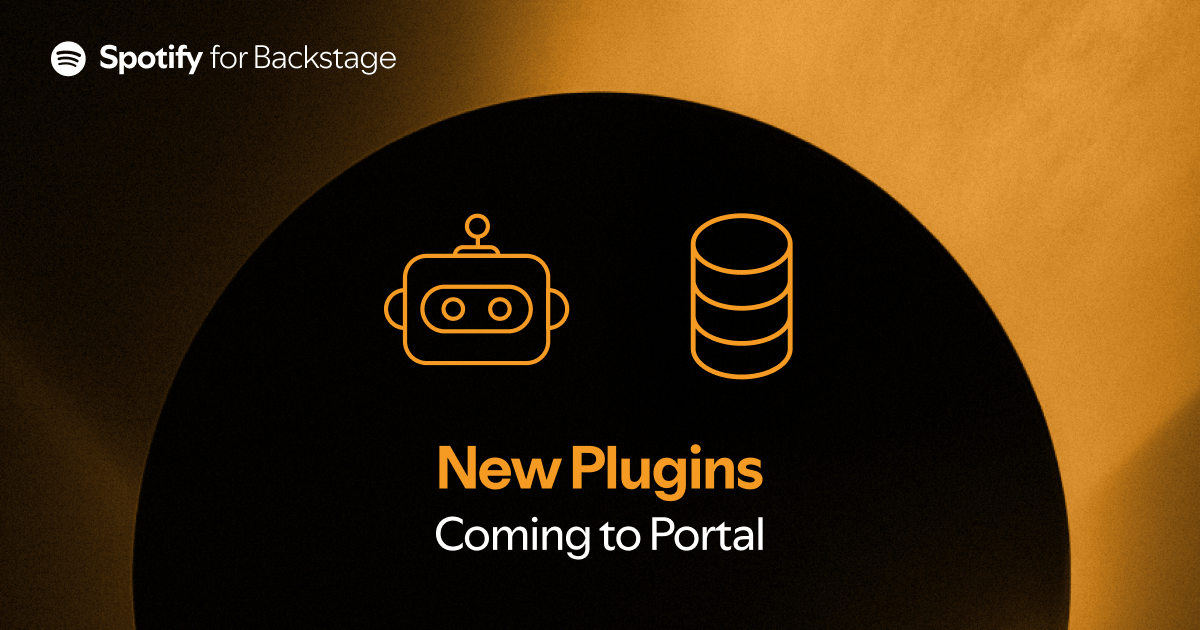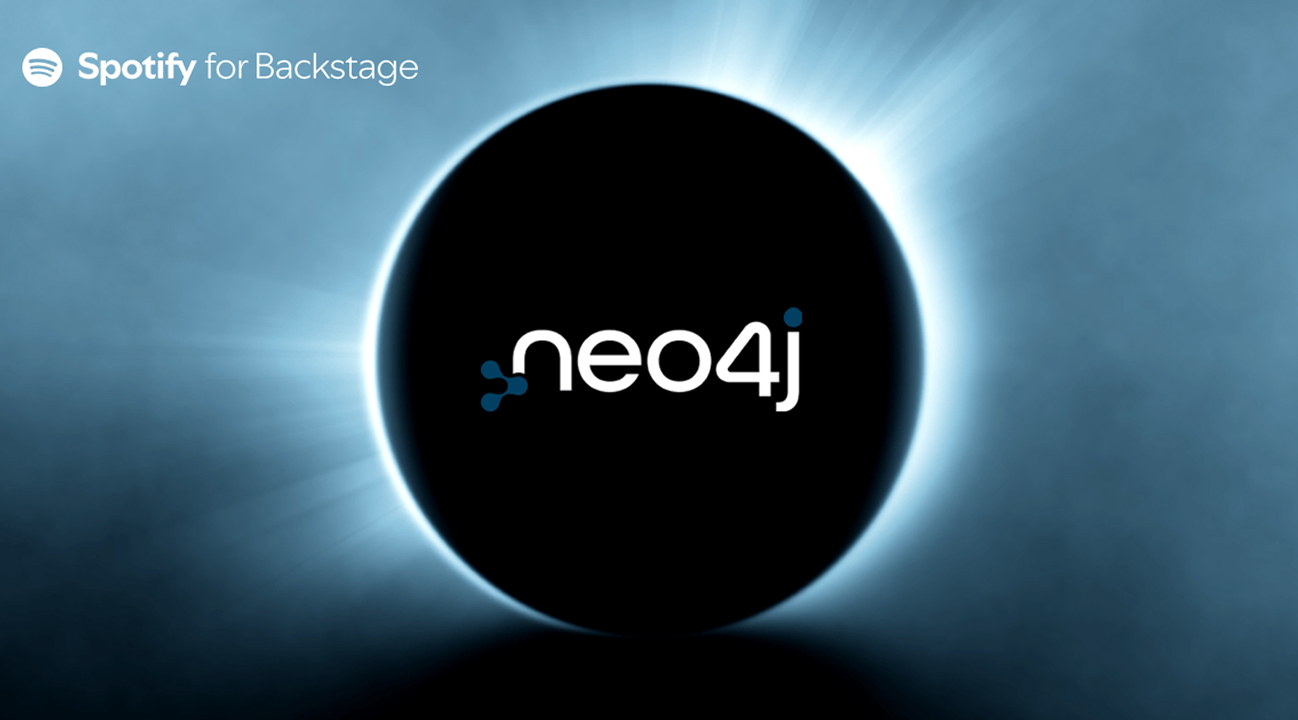AI knowledge assistant and data plugins coming to Spotify Portal

Heading 1
Heading 2
Heading 3
Heading 4
Heading 5
Heading 6
Lorem ipsum dolor sit amet, consectetur adipiscing elit, sed do eiusmod tempor incididunt ut labore et dolore magna aliqua. Ut enim ad minim veniam, quis nostrud exercitation ullamco laboris nisi ut aliquip ex ea commodo consequat. Duis aute irure dolor in reprehenderit in voluptate velit esse cillum dolore eu fugiat nulla pariatur.

Block quote
Ordered list
- Item 1
- Item 2
- Item 3
Unordered list
- Item A
- Item B
- Item C
Bold text
Emphasis
Superscript
Subscript
Earlier this month at KubeCon + CloudNativeCon Europe 2025, we announced two new plugins coming to Spotify Portal: our AI knowledge assistant plugin, known as AiKA, and our Data Experience plugin. We’ve been using internal versions of both plugins extensively at Spotify for years, and we’re excited to begin testing the external alpha versions with our enterprise customers and Design Partners. Featuring tight integrations with other plugins (such as TechDocs, Soundcheck, and the Software Catalog), the plugins demonstrate the multiplying value that comes from centralizing your infrastructure and your teams with Portal.
AiKA (α): The AI knowledge assistant that knows what your org knows
One of the main benefits of an internal developer portal (IDP) is centralizing the kind of knowledge that is usually scattered across an engineering org — technical documentation, ownership information, internal standards, APIs, etc. The goal is to break down silos and enable access to your org’s collective knowledge, so that teams can get the right information at the right time. Integrating an AI chatbot brings this knowledge sharing and discovery to the next level.
Universally useful
The inspiration for AiKA came from a Spotify Hack Week that spawned several promising projects for an internal AI chatbot — AiKA consolidated those efforts into one. Designed to meet our devs where they are, the first production version of AiKA was deployed to our internal Backstage instance in December 2023. Since then, usage of AiKA has steadily grown across the board. With access to almost all our internal knowledge bases in such an approachable, natural way, both developers and non-developers alike are using AiKA to answer all kinds of Spotify-specific questions, from learning how a particular system or tool works, to getting reference code, to company policies.
- Over 1,000 Spotify employees use AiKA daily
- 25% of employees use AiKA weekly
- 70% of employees have used it at least once
Among our internal R&D community, the weekly active usage (WAU) is much higher: 86% of our weekly active GitHub users are also weekly active users of AiKA.
Improving both access and quality
Whether it’s a new hire getting up to speed, a veteran engineer switching to a new team in a different part of the company, or just someone trying to decipher all those acronyms everyone assumes everyone else knows (WAU, BOM, FOSS, OSPO, l10n, ARPU, anyone?), AiKA doesn’t just give people access to the info they need when they need it, it’s also reducing support load and the number of random questions in Slack and other channels.
Another benefit we’ve seen is that as the value of AiKA becomes more apparent to teams, the more the teams want to contribute to its knowledge base. Teams started prioritizing creating and updating their existing documentation, making sure their docs followed internal best practices so that AiKA could learn from them. So, not only did access to internal knowledge improve through AiKA, but so did the quality of our knowledge bases.
What to expect in the AiKA alpha
AiKA uses retrieval-augmented generation (RAG) to understand your organizational and data ecosystem, including being able to reference its source material. We’ll begin testing an alpha version of the external AiKA plugin with select Portal customers and Design Partners at the end of April.
This alpha version will not be at feature parity with our internal version of the plugin. It will prioritize support for key word search and integrations with TechDocs and OpenAI only. (Our internal AiKA draws on multiple sources for information and includes different LLM options in the backend.)
If you would like to help us test and shape our new AiKA plugin, apply for the Spotify Portal beta to become one of our Design Partners.
Data Experience (α): Manage data just like you manage software components
The Software Catalog in Portal provides component owners with the ability to manage all their services, websites, and libraries in an easy to understand way. But the Catalog isn’t just a list of all the software components in your org. It’s also a graph of dependencies, ownership, tech health, software lifecycles, and much more, giving you a comprehensive — and comprehensible — view of your entire software ecosystem. Instead of drowning in the chaos of microservices, orphaned experiments, and a spider’s web of dependencies, you can search, filter, measure, and explore your internal ecosystem with ease.
But why leave data out of the fun? What if you could manage data the same way you manage software components in Portal? Enter the Data Experience plugin.
Managing data at Spotify scale
At Spotify, we capture more than 1.6 trillion events per day — with 24 million events per second at our weekly peak and 31 million events per second as our yearly peak (during Wrapped, of course). We have more than 42,500 active data pipelines, with datasets of all kinds, created and used by teams all over the company. How do we keep all this data straight for both data producers and data consumers? There’s a plugin for that. (Though, really, it’s more of a platform…)
Data as a first-class citizen in Portal
With the Data Experience plugin, datasets live as their own entities in the Software Catalog, where data practitioners and developers can easily view and manage them right alongside software components. The entity pages for datasets surface up-to-date metadata — such as owner, tags, and schema — so it’s easy for anyone to understand the purpose of the data. Instead of being siloed in specific data platform tools and difficult to access, suddenly your data ecosystem is searchable and discoverable — and therefore more usable — across your entire org.
What to expect in the Data Experience alpha
The Data Experience plugin will be a core feature of Portal. We are currently testing an alpha version with Portal customers and Design Partners. The Data Experience plugin enables you to discover, understand, and manage your business’s data in Portal by:
- Ingesting metadata from different data sources, modeling it in the Software Catalog, and providing visibility into your data ecosystem on the same plane as all other software entities
- Integrating with BigQuery, Redshift, Snowflake, and dbt (data build tool)
- Integrating with other core features of Portal so you can search, catalog, and manage your datasets in the exact same manner as you do software
- Allowing developers and data practitioners to self-serve information about datasets
- Leveraging Soundcheck to measure the health of your datasets via tracks, checks, and campaigns
If you would like to help us test and shape our new Data Experience plugin, apply for the Spotify Portal beta to become one of our Design Partners.
Keep up with all the latest
We’re excited to bring these new plugins to our enterprise customers so that other teams can take advantage of them and build like Spotify. To stay updated on the new plugins and other Portal features, follow us on LinkedIn.
Tom Barkan-Benkler is the product director for developer experience and Backstage at Spotify.
Spotify Portal is Spotify’s opinionated, SaaS solution for Backstage. Get up and running with a new IDP in minutes, with a no-code UI and our best practices built-in. Interested in trying Portal? Apply for the Portal beta and become one of our Design Partners.
